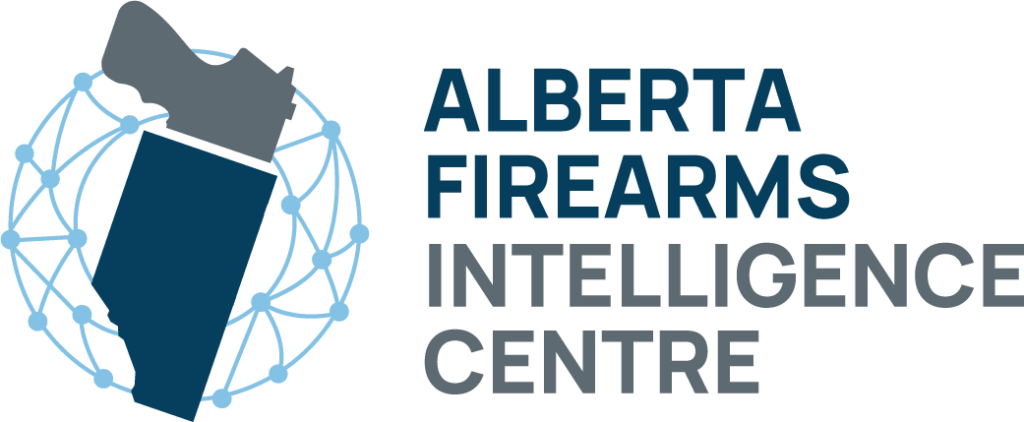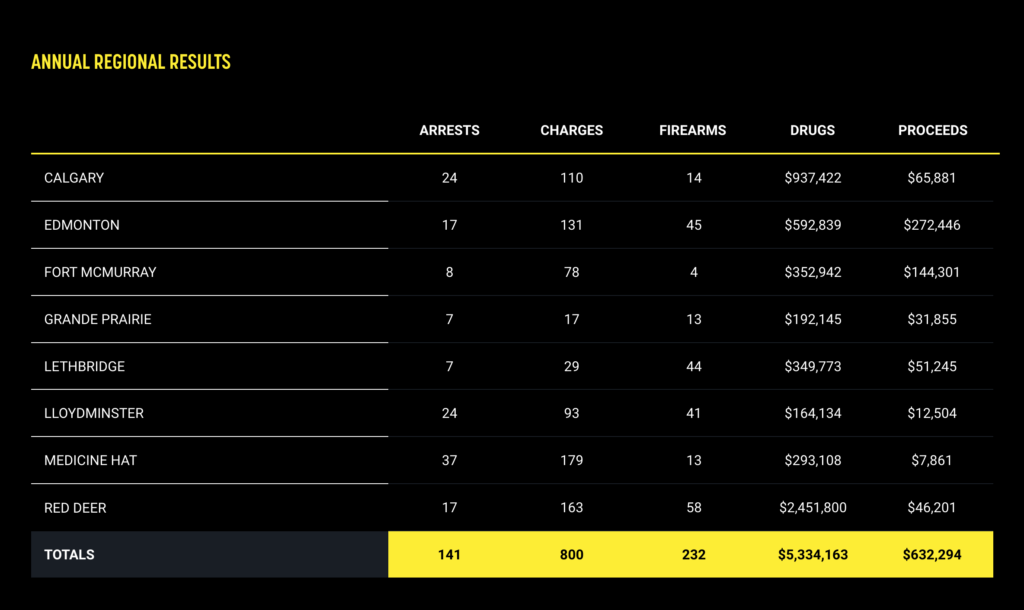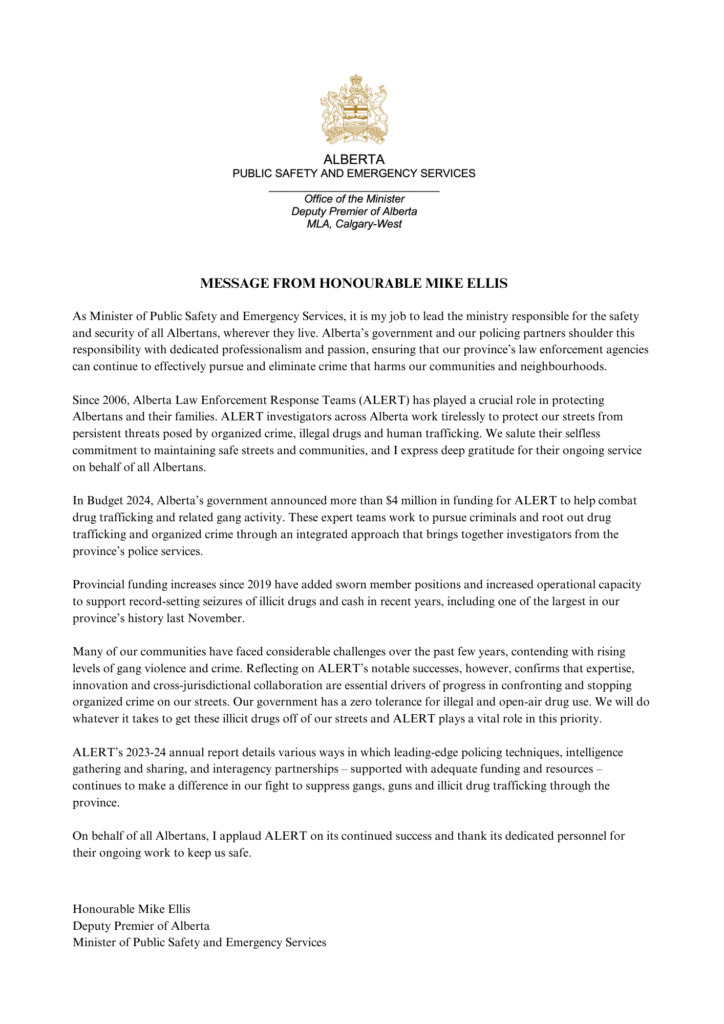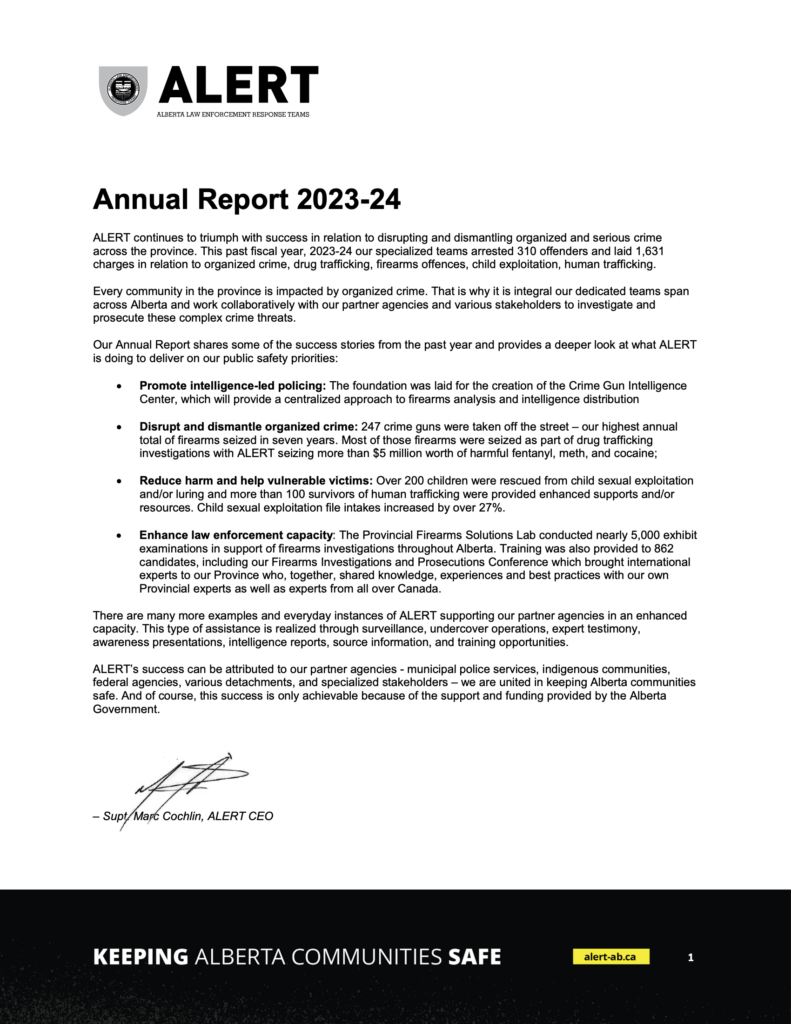When Justin Shipowich was sentenced on firearms trafficking charges in May 2018, Sgt. Eric Stewart was watching intently to see what kind of message would be sent.
Stewart heads up ALERT’s Guns and Gangs team, based in Edmonton, which investigated Shipowich’s straw purchasing case and arrested him in September 2018. Straw purchasing is the practice of buyers legally obtaining firearms and then reselling them to criminal markets.
Shipowich’s case was the first one involving straw purchasing to make its way through Alberta courts. He eventually received an eight-year prison sentence — one Stewart says is a significant message to others contemplating doing the same thing.
“We want the sentences to be hefty and high,” he said. “Once you’ve taken that step to purchase a gun and then sell it illegally, you’ve now put a gun on the street that could cause a lot of damage. You are responsible for that, and I think the sentences should be high to demonstrate that.”
In October 2018, shortly after Shipowich’s sentence was handed down, the Guns and Gangs team made an arrest in another straw purchasing case. Philip Edward Sarrasin, 26, was arrested in Calgary after handguns he allegedly bought in Calgary turned up in criminal cases as far away as Toronto.
“We’ve seen a trend lately of more straw purchasing investigations in Edmonton and northern Alberta,” Stewart said. “Why that is, I don’t know. I don’t think it’s any easier to purchase guns here than it is in B.C. or wherever. But, talking to outside agencies and other police officers, the trend has been that people come to Edmonton to purchase guns.”
Straw purchasing has been around a long time in Alberta, but activity — and thus enforcement — has picked up over the past 10 to 15 years due to a few different factors, including the increased gap in values between the Canadian and the U.S. dollar, as well as greater awareness of the practice among organized crime groups.
“From our experience, people who become straw purchasers are people that, at one point, had legitimate jobs and, in some cases, fell on hard times. They had a firearms license already, and they were exploited or identified – or maybe they reached out themselves,” Stewart said.
The guns that Stewart and his team deal with are those defined as “restricted” or “prohibited” under the Criminal Code of Canada, including all handguns, automatic and semi-automatic weapons, sawed-off shotguns, and certain types of rifles. He says they see a wide variety of those guns in their investigations.
Being the only ALERT unit specifically addressing firearms in Alberta, the Guns and Gangs team typically only takes on one straw purchasing file at a time. Stewart said these investigations are complex — more complex than drug investigations he worked on earlier in his career — with multiple search warrants and judicial authorizations needed.
But that’s where they can engage partners such as the Alberta Chief Firearms Officer’s office, the RCMP’s National Weapons Enforcement Support Team, other ALERT teams and municipal police forces. And the team has a great relationship with the Alberta Crown Prosecution Service, with whom they work closely to ensure straw purchasers are brought to justice.
“Three years ago, when we rolled out the Guns and Gangs mandate, we identified that we had to establish a good relationship with the Crown prosecution,” Stewart said. “Those guys work their tails off to push these through the courts and seek those high sentences for us.”
There’s no blueprint to these firearms investigations, Stewart said – some exist on their own, while others get tangled up in drug trafficking and other crimes. “We initiate the investigation on the firearms offences, but as it unravels and continues, you might identify other offences.”
While Stewart doesn’t think straw purchasing will be eradicated anytime soon, he says law enforcement agencies are willing to learn from each other to help curb the practice, and he hopes they’ll be able to share data more efficiently in the future to work toward their goals. “It’s a privilege to own a gun, not a right,” he said.
The work we do is about our communities, and that’s why we recognize that residents can be instrumental in tackling serious crime. If you or someone you know has been the victim of a crime, or you suspect criminal activity, please reach out. Your information will remain strictly confidential.
Thank you for helping to make Alberta safer by being actively involved and reporting suspicious activity.


Since 2022, CISA has been guided by four pillars that focus the effort to promote an integrated, intelligence-led approach to combating organized crime; these are:
Criminal Intelligence Service Alberta (CISA) has recently developed an Alberta Firearms Intelligence Centre (AFIC) to equitably expand access to firearms intelligence for all law enforcement agencies within Alberta. AFIC will provide timely, accurate, and actionable intelligence to law enforcement agencies and policy-makers to achieve the shared and collaborative goals of increasing public safety concerning firearm-related crimes.
Q1
Q2
Q3
Q4
2023-24
2022-23
2021-22
FILE INTAKES
680
872
1,149
1,114
3,815
2,994
2,764
SUSPECTS CHARGED
22
16
34
37
109
81
125
CHARGES LAID
87
45
123
160
415
351
413
CHILDREN RESCUED
26
78
56
43
203
46
100
EXHIBITS SEIZED
335
368
545
476
1,724
1,243
1,845
TOTAL PHOTOS/VIDEOS
262,400
511,133
1,374,310
606,254
2,754,097
2,551,921
13,260,819
Q1
Q2
Q3
Q4
2023-24
2022-23
2021-22
SUSPECTS CHARGED
13
10
7
4
34
30
76
CHARGES LAID
79
46
87
19
231
96
157
VICTIM INTERVENTIONS
30
29
17
37
113
28
22
Q1
Q2
Q3
Q4
2023-24
2022-23
2021-22
INTELLIGENCE REPORTS
409
296
327
442
1,474
1,560
1,318
TRAINING COURSES
5
3
8
11
27
36
25
CANDIDATES TRAINED
321
56
135
350
862
933
638
Q1
Q2
Q3
Q4
2023-24
2022-23
2021-22
SUSPECTS CHARGED
40
27
42
32
141
197
168
CHARGES LAID
176
156
237
231
800
1,088
820
FIREARMS SEIZED
105
53
26
48
232
102
126
EST. VALUE OF DRUGS SEIZED
$906,814
$553,851
$2,725,161
$1,148,337
$5,334,163
$10,898,269
$334,093,020
PROCEEDS OF CRIME SEIZED
$218,133
$52,970
$130,996
$230,195
$632,294
$1,432,847
$21,740,617
ARRESTS
CHARGES
FIREARMS
DRUGS
PROCEEDS
CALGARY
24
110
14
$937,422
$65,881
EDMONTON
17
131
45
$592,839
$272,446
FORT MCMURRAY
8
78
4
$352,942
$144,301
GRANDE PRAIRIE
7
17
13
$192,145
$31,855
LETHBRIDGE
7
29
44
$349,773
$51,245
LLOYDMINSTER
24
93
41
$164,134
$12,504
MEDICINE HAT
37
179
13
$293,108
$7,861
RED DEER
17
163
58
$2,451,800
$46,201
TOTALS
141
800
232
$5,334,163
$632,294
Q1
Q2
Q3
Q4
2023-24
2022-23
2021-22
SUSPECTS CHARGED
1
–
1
–
2
1
10
CHARGES LAID
–
–
–
–
–
11
47
STOLEN VEHICLES
23
15
1
6
45
245
118
RECOVERED ASSETS
$1,432,000
$941,025
$108,000
$260,000
$2,741025
$8,420,500
$3,919,500
Q1
Q2
Q3
Q4
2023-24
2022-23
2021-22
FIREARMS EXAMINATIONS
349
351
243
235
1,178
–
–
EXHIBIT EXAMINATIONS
1,316
1,409
891
1,099
4,715
–
–
SERIAL NUMBER RESTORATIONS
31
34
19
24
108
–
–
IBIS SUBMISSIONS
343
421
1,334
304
2,402
–
–
GUN SEIZURES
–
–
1
14
15
–
–
SUSPECTS CHARGED
–
–
4
22
26
–
–
CHARGES LAID
–
–
41
144
185
–
–



Child Sexual Abuse Material (CSAM) involves images and/or videos that depict the sexual abuse of minors – the majority of which involve prepubescent children. Often, CSAM involves explicit and/or extreme sexual assaults against the child victim (Cybertip.ca).
Learn more about Internet Child Exploitation and ALERT’s integrated teams combatting this issue.
Ghost Guns are illegal, privately manufactured firearms or lower receivers. These weapons are often made with 3D-printers, and undermine public safety due to their lack of licensing requirements, serialization and safety controls.
Learn more about Ghost Guns on ALERT’s dedicated Privately Manufactured Firearms info page